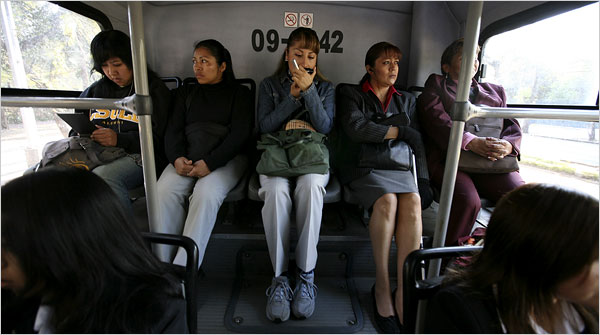Go to original article to view video: In Mexico: A Bus of Women's Own
Mexico City Journal
On Single-Sex Buses, Relief From Unwanted Contact
Published: February 11, 2008 - NY Times
By MARC LACEY

(above) Women, who complain of harassment on Mexico City's crowded transportation system, have found a haven in restricted buses. Photo: Jennifer Szymaszek for The New York Times
MEXICO CITY -- Body-to-body contact is inescapable on Mexico City's crowded public transportation system. Get on a train or a bus during rush hour and a man in a business suit may have his arm resting against your shoulder, a woman toting a bulky shopping bag may have her back pressed against your flank, and a teenager listening to an iPod may tap his sneaker all over your newly shined left shoe.
But many women complain that not all the contact is incidental. Among the 22 million passengers who use the bus and subway system daily, women say, are lecherous men taking advantage of the cheek-to-jowl conditions to leer and grope and then quietly disappear.
"There are good men in Mexico, but they're not the ones on public transport," said Mariana Vasquez, 30, who waited to board a bus recently on her way to a job interview at a law firm. "They try to touch you. They don't give you a seat. Where are the gentlemen?"
One place they are not is on new women-only buses that Mexico City began running in January to reduce the harassment. With pink placards and insistent drivers who growl at any man who tries to step aboard, the buses are quickly becoming a hit among women.
"Woo-hoo!" bellowed Catalina Garduño the other day as man after man was turned away from the bus she was riding. Her outbursts animated the other women on board, who joined in the celebration. As they rolled along Paseo de la Reforma on their way home from work, the atmosphere resembled a ladies' night on wheels.
Their relief reached beyond their escape from being accosted physically.
"We don't get paid as much as they, yet we work just as hard," said Ms. Garduño, a saleswoman. "We are tired of their machismo. We don't feel sorry for them at all."
A few rows back, Abigail Llanes, 21, expressed a similar sentiment.
"We get to sit now," she said, beaming. "It's great."
As complaints of harassment have grown, Mexico has experimented over the years with various remedies. Some subway cars have been reserved for women. Some buses allow women, disabled people and those with children to use designated entrances at the front. But the new buses may be the boldest approach so far.
Men's reactions run the gamut. Some declare the program discriminatory. Some curse at the bus drivers who leave them standing at the curb.
Plenty of men, though, say they endorse the idea.
"We have no respect," Adolfo Flores, 30, a law student, said of the unseemly way many men treat women.
Mr. Flores was getting his shoes shined as buses passed by behind him. The shoeshine man, Esteban Hernández, 57, piped in with his own theory about the groping.
"We have the animal instinct," he said, smiling. "Touching a woman," he said, "is a way of showing masculinity -- it's very bad."
Just how bad the abuse problem -- which is raised by women in cities the world over -- has become in Mexico is difficult to say. Last year, just seven women lodged official complaints of harassment on Mexico City's buses. There are more reports of sexual incidents on the subways, with roughly one a day filed with the authorities. But Mexican officials believe those figures do not reflect the full extent of the problem.
"Most women don't report what happens to them," said Ariadna Montiel, who directs the public bus system, noting that as a young architecture student years ago she traveled by public transportation and experienced the harassment firsthand. "I know it's a serious problem."
Ms. Montiel said she had no intention of neglecting men. "We have to guarantee that all users are taken care of," she said, adding that coed buses roll along in close proximity to the women's buses to ensure that nobody is waiting too long.
Passengers say the atmosphere aboard women's buses is entirely different. As the buses become more popular, and crowded, some women politely offer their seats to others. And, they say, the lechers are gone.
Still, the experiment cannot solve the underlying problem of how the sexes interact in the metropolis. Only four of the city's bus routes have women-only buses. That number will rise to 15 in the months ahead, but coed buses will remain the rule in most areas.
To complement the single-sex buses, the Institute of Women in Mexico City, a government body that promotes opportunities for women, is pushing a public education campaign to make clear to men that inappropriate touching is illegal. In March, a new ordinance will make it easier to prosecute those found harassing women in public places.
"This is not against men," insisted Martha Lucia Micher Camarena, the institute's director general. "This is positive discrimination that responds to the demands of women. And it's also for men because it protects their daughters, sisters and mothers."